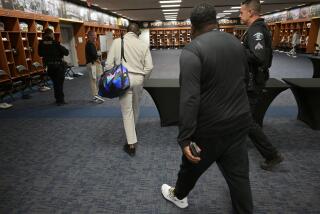Player Adds to Wheeler Details
- Share via
Northwestern football player Rashidi Wheeler used a potentially dangerous dietary supplement just hours before engaging in a rigorous conditioning drill during which he collapsed and later died, a teammate told a strength coach as Wheeler was being taken away from the field in an ambulance.
Larry Lilja, Northwestern’s longtime strength coach, said late Sunday that the player--whom he declined to name--told him he “had reason to believe” Wheeler had used a supplement the same day as the drill, Aug. 3.
Wheeler was pronounced dead within minutes of his arrival that afternoon at Evanston (Ill.) Hospital, near Northwestern’s campus north of Chicago. The comments Sunday mark the first public allegation that Wheeler had used a supplement the day of the drill. Teammates and other sources alleged Friday he had used them previously.
Meantime, Northwestern Coach Randy Walker said Sunday night that he had been asked by Athletic Director Rick Taylor to stop using the drill--a demanding set of 28 sprints from 100 to 40 yards--while the university investigates the circumstances surrounding Wheeler’s death.
Walker, who said last week he is “beyond sorry” for Wheeler’s death, said he would comply.
“We are going to look at every aspect of this tragedy,” Walker said Sunday night. “Running. Conditioning--and that includes the drill.
“I understand the university’s desire to be thorough and cover every base,” Walker said. “As I said, I welcome the truth.”
Told Sunday that the drill would no longer be in use, the Rev. Jesse Jackson, acting as a spokesman for Wheeler’s family, said, “It’s a little late, isn’t it? A little late.”
In all, 10 Wildcat players collapsed that day; none of the others has reported serious injury. Temperatures were in the 80s at the field on the northern reaches of Northwestern’s campus, along Lake Michigan.
Teammates have said that a number of players were using supplements that day, and when so many went down, suspicions immediately turned to the use of Ultimate Orange and Xenadrine, two supplements well-known in football and athletic circles. Each contains the stimulant ephedrine, banned by the NCAA and the International Olympic Committee. Each also contains caffeine.
Supplements are legally and widely available over the counter and the Internet. They are often promoted as a way to lose weight or to build strength or energy. Millions of people use them safely.
But experts increasingly have warned that they may create serious health risks when used improperly, such as when combined with medication or strenuous activities such as running.
One player, speaking on condition of anonymity, said last Friday, “There have been in the past, and on that day [Aug. 3], there were people taking dietary supplements,” adding, “I know it’s used on the [Northwestern] team.” He said he had seen Wheeler ingest Ultimate Orange “sometime in the winter.”
Kim Will, Wheeler’s aunt, said Sunday the family remains unsure if Wheeler took Ultimate Orange. She said, though, there is outrage within the family over concerns Northwestern players might have felt enormous pressure to meet Walker’s strenuous training regimen. Completing the 28-sprint drill was a prerequisite for players.
Jackson said, “The family is inquiring about the death and will inquire further, but the family is also in intense grief right now.
“It’s one thing to say a kid was on heroin or crack cocaine and quite another to discuss authorized drugs. These things are supposed to be safe. The family doesn’t want anything said that would discredit Rashidi’s life.”
David Jenkins, head of Carlsbad-based Next Nutrition, said Friday the company stopped manufacturing Ultimate Orange in May. He did not say why.
Three months earlier, Next Nutrition paid $4 million in an out-of-court settlement to a career Army soldier and Gulf War veteran who had been using Ultimate Orange for more than a year when he suffered a stroke in 1998. There was no admission of guilt and the product is still widely available.
The makers of Xenadrine could not be reached for comment. Asked about the health risks of using ephedra derivatives while exercising, Jenkins said Friday, “All I can say is, see your physician before you use it. It’s clearly marked on the bottle. I am sorry to hear about the young man’s death.”
A funeral for Wheeler, 22, of Ontario, is scheduled today in Pomona. The medical examiner’s report listed bronchial asthma as the cause of death; final autopsy results are pending. There is no indication supplement use played a role in his death.
Jackson said if the toxicology tests reveal supplement use played a role in Wheeler’s death, he could foresee litigation against the maker.
“This has many ramifications,” he said. “Many.”
Wheeler’s death is one of a number of recent football-related fatalities that have raised questions about possible links to the use of supplements, in particular those that include ephedrine.
Curtis Jones, 34, died last Sunday after playing an indoor arena-style professional football game in Las Vegas, apparently from cardiac arrest. A three-sport star at San Pedro High who played college football at Utah, he had used a capsule called Hydroxycut for three months ending in August 1999, according to his wife. It contains ephedrine; effects can linger for years, experts say.
The manufacturers of Hydroxycut could not be reached for comment.
In February, Florida State linebacker Devaughn Darling collapsed and died after a workout. Autopsy results were inconclusive about the cause of death but revealed in his system the presence of ephedrine.
Initially, the Northwestern inquiry into Wheeler’s death was expected to focus on the drill and staff readiness for any medical emergency. A phone on the field where the drill was run did not work; rescue crews were called by cellular phone.
Jackson, appearing at a press conference last Thursday on the family’s behalf, said then it appeared that “the infrastructure was inadequate.”
The disclosures about supplement use on the team, however, have broadened the focus. An aspect of any inquiry is now sure to include the issue of whether Northwestern officials encouraged, ignored or even knew about the extent of supplement use on the football team.
“All these stories continue to increase the liability against the university,” Jackson said.
Jackson also said that if supplement use was not uncommon among Northwestern football players “and everyone knew about it, then everyone associated with the team would have known about it.”
Walker has previously said he is unaware of the extent of supplement use on his team.
Lilja, the strength coach, said Northwestern conducts random tests of its athletes throughout the year. A warning on the Ultimate Orange label instructs athletes subject to NCAA, IOC or other drug tests to stop using it five days before providing a urine sample.
Asked if he provided Northwestern athletes with supplements, Lilja said no.
“If you take any supplements,” he said, “you need to clear it with Tory,” a reference to team trainer Tory Aggeler, “to make sure it’s cleared with the NCAA.” Aggeler could not be reached Sunday for comment.
Northwestern requires its players to tell a team doctor if they are taking any medication or over-the-counter substances, including over-the-counter supplements. Wheeler underwent a July 12 physical. It remains unclear what he told the doctor that day. Asked about Ultimate Orange and Xenadrine, Lilja said, “If [any player] had come to Tory or me, we would have told him not to take it. Absolutely.”
Lilja also said it’s unclear to him why any Northwestern football player might have felt the need for a dietary supplement. “The team worked hard all summer,” he said. “They were in great shape.”
If it’s true that supplements were used, “that would have only made the [drill] harder,” he said, adding, “Why they felt they had to use an insurance policy baffles me.”
More to Read
Go beyond the scoreboard
Get the latest on L.A.'s teams in the daily Sports Report newsletter.
You may occasionally receive promotional content from the Los Angeles Times.











